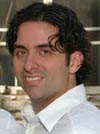by Dale Sadler
Do you ever feel lost as a father? Does it seem like your idea of what should be happening … isn’t? Maybe the path your child is taking or the level of success he is achieving doesn’t quite match up with your timeline?
I struggle with this. My son is four and a half, and there are times when I’m convinced that he should be able to master a physical skill—like swinging himself—until I discover that some six-year-olds can’t do that yet.
 Not long ago, I discovered a fascinating book on wilderness survival that has given me some new insights about why I tend to do this, and it has some other useful applications to my fathering. In this book, Deep Survival: Who Lives, Who Dies, and Why by Laurence Gonzales, the author tells true stories of people who become lost and even die in the wilderness. He contends that people meet their ultimate demise this way because they don’t adapt. They apply old forms of reasoning—which he calls “mental maps”—to new experiences, and this often leads to bad decisions.
Not long ago, I discovered a fascinating book on wilderness survival that has given me some new insights about why I tend to do this, and it has some other useful applications to my fathering. In this book, Deep Survival: Who Lives, Who Dies, and Why by Laurence Gonzales, the author tells true stories of people who become lost and even die in the wilderness. He contends that people meet their ultimate demise this way because they don’t adapt. They apply old forms of reasoning—which he calls “mental maps”—to new experiences, and this often leads to bad decisions.
For example, even accomplished outdoorsmen will sometimes struggle while hiking in unfamiliar terrain and higher altitude. They may make decisions based on past experiences, underestimate or fail to adapt to the new challenges, and miss common-sense solutions that would save them a lot of time and trouble—and maybe even their lives. They become victims because they aren’t willing or able to adjust their mental maps.
 I believe mental maps are used in fatherhood as well. It could be a dad trying to relate to his daughter by applying the map of reasoning he depends on at the office. Chances are, it won’t work; he needs to adapt his approach to her specific needs.
I believe mental maps are used in fatherhood as well. It could be a dad trying to relate to his daughter by applying the map of reasoning he depends on at the office. Chances are, it won’t work; he needs to adapt his approach to her specific needs.
Maybe it’s more common for dads to use the faulty mental map that I call a case of the “supposed-to’s”: Junior is supposed to eat what Dad tells him to. Sally is supposed to be making all A’s. Junior is supposed to be the starting quarterback. While these may be valid expectations, our mental maps, rather than solid evidence, often drive our actions. Maybe you were strong in a certain area, so your child should be too.
What’s wrong with this? The desire to force a child to be a certain way sacrifices the growth that could occur otherwise because it doesn’t consider the child’s unique gifts and interests. Consequently, this impedes a lot of the good the father could possibly do in shaping his child. Maybe he’s not a very gifted athlete right now. Well, he may never be if he feels pressure to perform beyond his capabilities. This is a faulty mental map that has not adapted. Forcing a child to perform is like training for a sport by skipping the basics.
Also, too often dads use mental maps like I described with my son: we assume we know how quickly our children should be progressing in life, and we try to force our own time line on them and overlook their talents and developmental growth. It took me three years to reach my weight lifting goal. Had I been forced into a shorter time line, I may have never attained it. Your daughter can possibly be the best softball player in town, but if her spirit is wrecked from ridicule because she’s not making immense strides, you can forget it. Little by little, children can excel, and we must respect that. That’s not me talking, it’s nature.
What’s a better approach? I have two suggestions:
First, check your motivation for why you are pushing your son or daughter to succeed. Is it for his good or for your own? There is a deep pride that fathers carry when their children succeed at something. When you see a glimmer of talent in a child, excitement takes over, and it may take over so much that your child’s acceleration to the next skill level may be impaired because of your desire to get him or her there too quickly. It’s important to distinguish between your own dreams and desires for your child and what is truly best for him.
Now, if your encouragement and prodding is based on evidence of the child’s talents and past accomplishments, then that may be a different matter. Children can be lazy unless they are pushed to do their best, but please make sure they can reach the goals you set for them. If your goals are too lofty, your child could fail repeatedly and become discouraged.
Second, you must understand your child. Ask yourself, “What is he good at and how can I help him get better?” Focus on discovering a child’s strengths and then helping him capitalize on those strengths. Avoid comparing him to other kids or basing your expectations on some other faulty mental map of where you think he should be. By stepping back and analyzing the situation, you can get a clearer grasp of where your child is, which will greatly increase the chances that your actions as a father will help him achieve his full potential. You may need to give up with some of your own goals and expectations for your child, but it’s much better for the child in the end.
Dad, if you’re like me, you’re often very quick—sometimes too quick—to jump in and fix things. If my first attempt doesn’t work, I sometimes get frustrated and do more damage than what was there at the start. (We’re more emotional than we’d like to admit sometimes.) Please do take action to help your child follow his dreams and find success in life, but please take it slowly. Sometimes, as hard as it is, you just need to stop and think. When you understand your child and what he needs from you, you’re much better prepared. That’s the best mental map for your fatherhood.
Another great benefit of understanding your child is that it will naturally lead to a tighter bond with him or her.
.
 Dale Sadler is a School Counselor, Licensed Professional Counselor, Mental Health Service Provider, speaker, minister, artist, and writer. He writes regularly on marriage, parenting, and men’s issues. Dale lives in White House, TN, with his wife and four-year-old son and brand new daughter, born just hours after approving the final edits for this article. Visit his website at www.insearchformore.com to subscribe to his blog and weekly podcast.
Dale Sadler is a School Counselor, Licensed Professional Counselor, Mental Health Service Provider, speaker, minister, artist, and writer. He writes regularly on marriage, parenting, and men’s issues. Dale lives in White House, TN, with his wife and four-year-old son and brand new daughter, born just hours after approving the final edits for this article. Visit his website at www.insearchformore.com to subscribe to his blog and weekly podcast.

